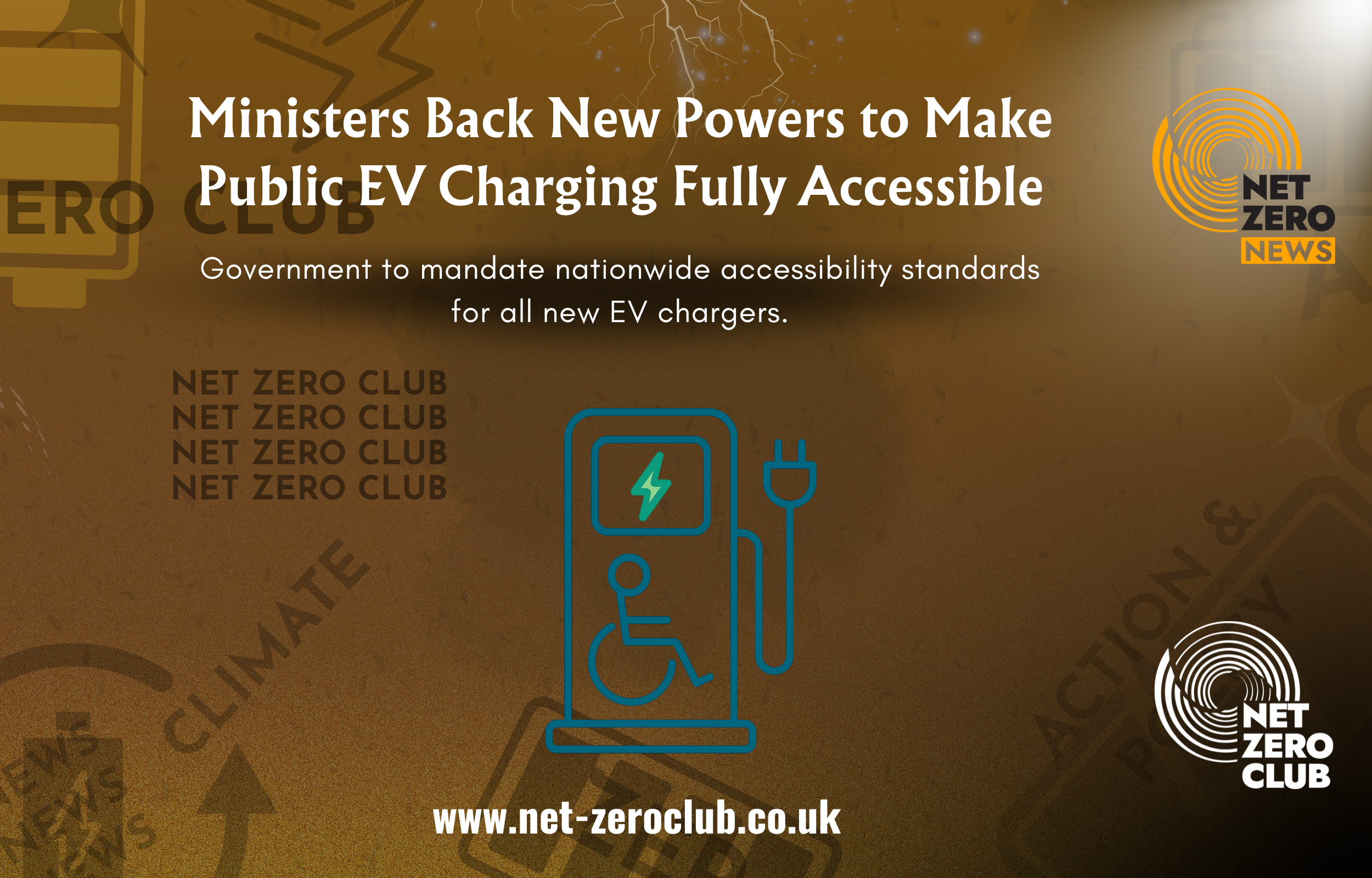Ministers Support New Powers for Accessible Public EV Charging

Hello, Champions of Net Zero!
In a significant stride towards inclusivity in electric vehicle (EV) charging, the Government has introduced a groundbreaking amendment to the Planning and Infrastructure Bill. This amendment empowers the Government to mandate essential accessibility measures at public EV charging points, ensuring that they are user-friendly and safe for all drivers, including those with disabilities.
As the demand for electric vehicles continues to rise, this pivotal amendment stands to transform the landscape of EV charging infrastructure across the UK. It not only marks a commitment to accessibility but also coincides with the release of a comprehensive report recommending updates to existing UK standards. These updates aim to enhance the delivery of accessible charging solutions that cater to the diverse needs of drivers.
The amendment, originally proposed by Conservative Peer Lord Borwick and later expanded by the Government, grants ministers the authority to enforce accessibility standards at all new public electric vehicle charging points. This measure is particularly crucial given the slow voluntary progress made by the industry so far. It reflects a growing recognition of the need for a charging network that accommodates every driver.
During discussions in the Chamber, Housing Minister Matthew Pennycook emphasised the Government’s commitment to collaborating with the sector to update current accessibility standards. He expressed his conviction that the Bill should provide further certainty in this crucial area. This sentiment was echoed by Conservative MP David Simmonds, who acknowledged the Government’s willingness to engage in meaningful discussions about electric vehicle charging.
The introduction of this amendment aligns perfectly with the ongoing parliamentary stages of the Planning and Infrastructure Bill. It also coincides with the publication of a Government report advocating revisions to the existing PAS 1899 framework. This framework delineates detailed accessibility requirements for public EV charging points, including specifications for minimum parking bay sizes suitable for wheelchair users, the strategic placement of bollards, and the orientation of payment terminals.
Published in 2022 as a voluntary standard, PAS 1899 has yet to see widespread compliance, with estimates suggesting that only three charging sites in the entire UK currently meet its criteria. This alarming statistic is underscored by a recent survey conducted by EVA England, which revealed that 47% of all drivers, regardless of disability status, have encountered accessibility issues with the existing infrastructure. Furthermore, over half (51%) of drivers with disabilities reported struggling with heavy charging cables at faster charging points.
In a related survey, a quarter of Motability Scheme customers—who rely on specially adapted vehicles—indicated that they would avoid current public charging infrastructure due to accessibility concerns. These findings underscore the urgent need for reform and highlight the barriers that many drivers face when attempting to transition to electric vehicles.
The recommendations put forth in the Government’s report are the culmination of a year-long review and consultation process involving industry stakeholders, consumer groups, and disability advocates. This collaborative effort aimed to identify practical improvements that would facilitate the implementation of accessibility standards across the charging network.
The amendment to the Planning and Infrastructure Bill not only aligns with these recommendations but also empowers the Government to enforce compliance with PAS 1899 in the future, should accessibility issues persist. It places responsibilities on all parties involved in the installation of charging points, requiring them to report accessibility-related data. This transparency will enable the Government to monitor compliance and publish accurate figures, should further action be deemed necessary.
Providing accessible public charging is increasingly recognised as vital for fostering an inclusive transition to electric mobility. With approximately 1.35 million drivers with disabilities on UK roads, the implications of this amendment are profound. Vicky Edmonds, CEO of EVA England, remarked, “This is huge progress for all drivers, especially those with disabilities. For the first time, we have the Government’s assurance that accessibility won’t be left to chance. These enabling powers will also incentivise greater action by industry to roll out accessible charging.”
Edmonds further emphasised EVA England’s long-standing commitment to this cause, expressing pride in the decisive action taken to ensure that the public charging network serves all members of society.
Lord Borwick, the initial proponent of the amendment, noted that the focus should not solely be on the legislative change itself but rather on the transformation of charging systems to enhance accessibility. “This amendment means we can finally ensure that as we move to electric driving, accessibility will not be an afterthought but a core design requirement of the public network,” he stated.
Lisa Jones, Chief Operating Officer of the Motability Foundation, echoed these sentiments, affirming the foundation’s long-held belief that the PAS 1899 standard should be mandated by law. She expressed satisfaction at the passage of the amendment, which she believes is crucial as an estimated 1.35 million disabled drivers in the UK will require access to public EV chargers by 2035. “It’s absolutely vital that charge points are made accessible,” Jones added.
The Motability Foundation is actively collaborating with the Government on plans for an updated version of PAS 1899. Jones reaffirmed the foundation’s commitment to establishing a standard that is both achievable and beneficial for all charge point operators, ensuring that the accessibility needs of disabled individuals are met. “We will continue to engage with all providers of public charging as part of this process. This will also ensure the standard is in a position to be mandated by law if that step is required,” she concluded.
This recent development marks a critical juncture in the evolution of electric vehicle infrastructure in the UK. As we strive towards a net-zero future, ensuring that all drivers can participate in the transition to electric mobility is paramount. The Government’s commitment to accessibility at public charging points is a significant step in the right direction, promoting a future where electric vehicles are accessible to everyone, regardless of their physical abilities.
As we move forward, it is essential for industry stakeholders, government entities, and advocacy groups to collaborate closely, ensuring that the charging infrastructure not only meets the needs of today’s drivers but also anticipates the needs of future generations. With continued pressure and advocacy, we can ensure that the road to a sustainable future is paved with accessibility for all.
In conclusion, the amendment to the Planning and Infrastructure Bill is not merely a regulatory change; it is a commitment to inclusivity, ensuring that the shift towards electric vehicles is equitable and accessible for all. The ongoing dialogue and collaboration between various stakeholders will be crucial in shaping a charging network that reflects the diverse needs of the UK’s driving population. Together, we can champion a net-zero future that leaves no one behind.

 Got net-zero news, project updates, or product launches to share?
Got net-zero news, project updates, or product launches to share? 


